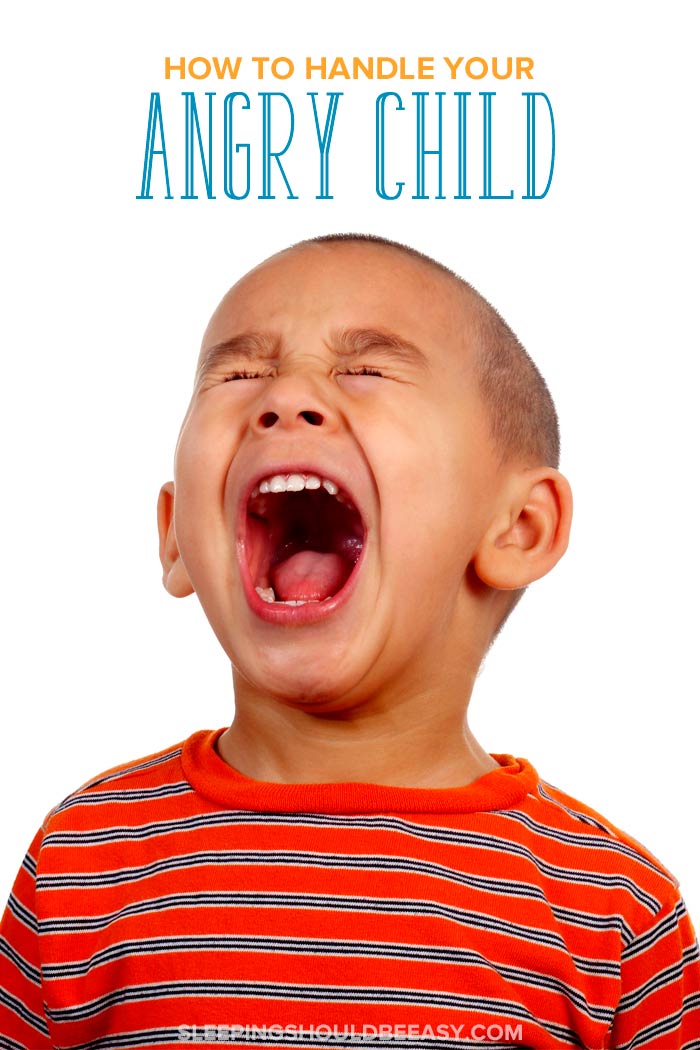How to Handle Your Angry Child
Dealing with meltdowns can be difficult, but it’s during these times your angry child needs you the most. Here are strategies to help you handle it.
 My son had been so excited to work on the school garden. You couldn’t peel him away from digging and turning the soil. Other than the occasional snack, he wanted to keep shoveling and pulling weeds.
My son had been so excited to work on the school garden. You couldn’t peel him away from digging and turning the soil. Other than the occasional snack, he wanted to keep shoveling and pulling weeds.
And then it happened: He didn’t want to leave when it was time. Nope, he wanted to stay and dig.
So, my husband and I did the typical moves. We showed empathy and tried to make the transition light. We gave him an incentive (“We’ll have lunch right when we get home”).
He finally followed us to the van, but once we got there, he burst into an epic meltdown. He was kicking the chair, crying, and trying to hit us. When we finally got home, my husband had to carry him all the way to the door. I wish I could say we kept our cool, but this isn’t a success story. Rather, it’s a learning moment.
Dealing with an angry child is draining for everyone involved. Over the years, I’ve learned what’s truly happening during these meltdowns and how we can respond in a calm, compassionate way. Take a look at these tips I’ve since learned:
Table of Contents
1. Remind yourself that your child needs you
After the tears dried and I’m sorry’s said from both sides, I thought about what happened. Why did I let his temper affect me? Why wasn’t I calm this time? What could I have told myself to better handle this situation?
And one phrase kept repeating itself: He needed you.
So, here’s my first piece of advice to you when you’re dealing with this kind of behavior. Don’t think of his it as a personal attack, that your child is testing your limits, or that this is another hassle to go through (“Great, this just ruined our morning”).
Instead, remind yourself that he needs you at this moment. The inability to manage his anger is something he needs to work on—with your help.
Free resource: Modeling correct behavior can be a challenge when kids don’t listen. Join my newsletter and discover the ONE effective word to get them to listen and follow instructions. Grab your PDF below—at no cost to you:
2. Contain unsafe or hurtful behaviors
Anger is normal and allowed, but the goal is to help your child regulate big emotions so he doesn’t escalate to explosive anger over every little thing. Don’t allow him to continue to hurt, hit, or break things around him.
Describe physical sensations he might feel so he can be more aware of the signs of anger before he explodes. You might say that when we get angry, we tend to feel our hearts beating faster, shaking in our bodies, and any other cues he might have.
In the future, he’ll know to look out for these cues and hopefully pause before he reacts.
3. Stay calm
Keeping our cool is hard, especially when we feel attacked, when our day feels ruined, or when we struggle with anger management ourselves.
But staying calm helps you think clearly. You’re more likely to stick to positive reinforcement and be the supportive parent your child needs you to be. Staying calm also models the kind of behavior she can copy. You’re showing her the skills she needs to learn and develop to manage her anger.
4. Accept your child’s emotions as real and normal
Disclosure: This article contains affiliate links. As an Amazon Associate, I earn from qualifying purchases.
At his most difficult times, your child just needs to feel heard. He wants to know that his feelings are valid and aren’t “childish” (even if to you it can seem like it). All these emotions and temper tantrums are normal, for every person and certainly for every child.
If he’s receptive, reach out and connect. Don’t lecture or give facts—instead, describe what you see. Let him know he seems upset that he lost a game, can’t find his toys, or has to leave a fun outing. Remind him that you’re here and will always love him, regardless of he behaves.
And if he allows it, embrace or put your hand on his back—the physical, non-verbal communication is a good reminder that you’re still here. As psychologist Ethan Kross wrote in Chatter:
“Research shows that when people feel the welcome, affectionate touch or embrace of those they are close to, they often interpret that as a sign that they are safe, loved, and supported. Caring physical contact from people we know and trust lowers our biological threat response, improves our ability to deal with stress, promotes relationship satisfaction, and reduces feelings of loneliness.”
But if he isn’t in the mood, then acknowledge that he isn’t, that you respect his space, and that you’re here when he’s ready.
5. Don’t diminish the reason your child got upset
We can say pretty insensitive stuff throughout our kids’ childhood, like, “Don’t worry—we’ll just get another one.”
As logical as that may seem to us, it’s not what they need to hear. They experienced an emotion about something meaningful enough to draw that kind of anger out of them.
To brush it aside as petty not only takes away the value of the reason your child cried but of his emotions as well. This won’t help decrease his anger and can even cause him to blame his frustration on you. He needs you to understand the depth of his frustration and that you take him seriously.
6. Only teach once your child is calm
Spoiler alert: trying to talk to an angry child will get you nowhere. At this stage, he’s too angry to listen to what you’re saying, much less process the lessons you’re trying to teach.
Once he’s calm, only then should you talk about what happened. Ask him to share what led to his anger or discuss what he can do about it moving forward. Have him tell you what you can do that could help as well.
Give constructive feedback and suggestions if he’s willing to listen to them. He can take a deep breath, say “I’m mad,” run to you for a hug, or write or draw about it. These can become his toolbox of ways to express anger in a better way.
And when everyone is calm, remind him that it’s okay to be mad. We all feel this way sometimes. Even though it doesn’t feel good, but these feelings go away after a while.
7. Evaluate what happened
Think about how you interact with your child. Have you been saying “no” too often? What triggered her anger? Could you have transitioned to the next activity better?
Then, think about what sets you off and makes you angry. Perhaps you lose your temper when she does something you’d just told her not to. With this awareness, you know you’re better off ignoring her deliberate defiance than feeding into that trigger.
Or ask yourself if the issue is that big of a deal. I’d wanted to leave the school garden, but we technically didn’t have to, at least not right at that moment. I wanted to make it home in time to prepare lunch, but I didn’t have to follow the schedule so closely if it meant helping my son transition better.
Waiting a little bit would’ve been all he needed to accept the situation and leave. Maybe he would’ve walked away much calmer if we had given him five more minutes.
8. Prevent anger in the first place
Most of what we’ve discussed deals with anger after the fact, but we can do plenty to prevent it in the first place. Speak with empathy to any of your child’s emotions so he feels understood and heard, even if you’re disciplining.
“Fill his bucket” and give him your full attention even for just 10 minutes a day. And make him laugh, which can also release some of the tension he may be feeling.
9. Model the right behavior
If we want our kids to have self-control and exhibit appropriate behavior, then we need to be a good role model. Simple as that. It’s hard not to get sucked into the emotional pull of an angry child. You feel frustrated, inconvenienced, or disappointed.
But the best way to teach her how to handle anger is to do it yourself.
That might mean pausing before you lash out. Saying “I’m going to my room because I feel too angry right now.” Or even apologizing after the fact to show that you’ve also made a mistake.
Conclusion
As normal as it is for kids to experience intense anger, responding to them can be difficult. But with the right steps, you can use these moments to teach your child how to manage his emotions.
Contain unsafe or aggressive behavior so he doesn’t continue to harm himself or others. Stay calm so you’re better able to think clearly and not feed the fire. Accept his emotions as real and valid, and don’t diminish the reason he got upset.
Talk about his angry outbursts only once he’s calm, and see what caused you to get just as upset. Prevent his anger from flaring up in the first place, and model the behavior you want to see in him.
That day in the garden wasn’t the last time I dealt with my kids feeling angry or lost my temper, but I’ve since learned better ways to manage it. And that day taught me an important lesson: Sometimes, our kids simply need us. Beneath the tantrum, anxiety, or aggression, they need our help to get them through it.
p.s. Check out Ravi’s Roar by Tom Percival to teach your child to manage anger:
Get more tips:
- How to Discipline a Toddler Who Doesn’t Listen
- How to Respond When Your Child Says Hurtful Things to You
- Why Time Outs Don’t Work (And What to Do Instead)
Don’t forget: Join my newsletter and grab One Effective Word to Get Your Child to Listen—at no cost to you:




